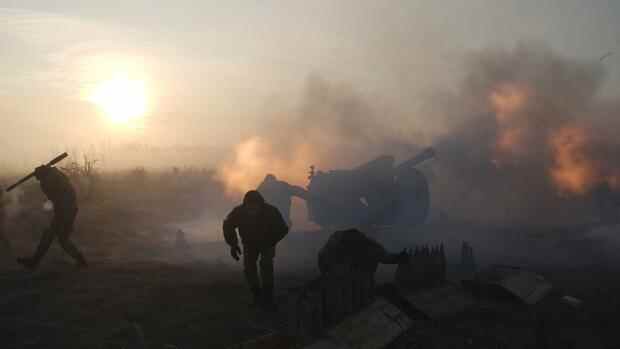Berlin After reports of atrocities in the village of Bucha near Kyiv, demands are being made in Germany to support Ukraine more than before with arms deliveries. “The federal government supports Ukraine far too little,” said the CDU member of the Bundestag and deputy chairman of the defense committee, Henning Otte, the Handelsblatt. Apparently, the three coalition partners in the traffic light do not agree on what contribution Germany should make. “As a result, Ukraine lost a lot of valuable time,” said Otte.
Economics Minister Robert Habeck (Greens) emphasized that, in his opinion, the delivery of military equipment and weapons should “continue unrestricted and on a large scale”. Germany just had to be careful not to become a party to the war itself.
Experts fear that Russia could see it as a reason for war, for example, if aircraft intended for the Ukrainian army were to fly into Ukrainian airspace from NATO territory. In March, considerations of supplying the Polish Air Force’s Mig-29 jets to Ukraine were therefore rejected.
The federal government continues to remain silent about the exact scope and nature of the arms deliveries. It is known that Germany has supplied large quantities of anti-tank and anti-aircraft weapons, protective equipment and ammunition. The government also gave permission for the Czech Republic to pass on armored personnel carriers, which it had acquired from the stocks of the National People’s Army of the GDR, to the Ukraine.
Top jobs of the day
Find the best jobs now and
be notified by email.
According to the “Süddeutsche Zeitung”, there is also a list in which the armaments industry has listed goods with a total volume of 300 million euros that could be delivered to Ukraine at short notice. These include bazookas, reconnaissance drones, mortars, automatic cannons, night vision or radar devices.
Defense Minister Christine Lambrecht (SPD) said during her trip to the USA last week that Germany had delivered armaments worth 80 million euros to Ukraine by then. This makes Germany the second largest supplier. A ministry spokesman later corrected that this only referred to the weight of the material supplied, which could include fuel. In terms of value, Germany is in third place.
Britain considers more military aid
However, there are also doubts about this, because other countries provide much more transparent information – and come up with far higher sums. In mid-March, for example, the US government announced an additional tranche of arms deliveries worth 800 million dollars. According to Estonia, it sent weapons worth more than 200 million euros. However, there is a difference whether the sales value is based on the purchase price, for example, or the volume after depreciation and depreciation.
According to government information, Great Britain had delivered armaments worth the equivalent of 132 million euros by March 23. The country is considering increasing its military aid, a spokesman for Prime Minister Boris Johnson said on Monday. There are inquiries about equipment that Ukraine could use to defend itself against attacks from ships.
The Ukrainian ambassador Andriy Melnyk said in an interview with the “Tagesspiegel” that his country was happy that Germany had made it into the top ten arms suppliers within a month. That is “really something that has to be appreciated” because, unlike other countries that had delivered before the Russian invasion, the Federal Republic had started from scratch.
Melnyk said his government first learned of the industry’s list of armaments worth 300 million euros from the media before Economics Minister Habeck handed it over. However, this list does not contain any heavy equipment that is urgently needed. So far there has also been no concrete commitment as to the extent to which the federal government wants to finance purchases from manufacturers.
“This is an embarrassment for Germany and cannot go on like this.”
(Photo: dpa)
In Germany, too, calls for speeding up arms deliveries to Ukraine are getting louder. The bureaucracy in the Federal Ministry of Defense is preventing more speed, said CSU boss Markus Söder on Monday after a board meeting of his party. Minister Lambrecht seemed completely overwhelmed. “This is an embarrassment for Germany and cannot go on like this.”
Economics Minister Habeck also indicated that he sees the problems primarily in the SPD-led Ministry of Defence. Germany had entered into an obligation to deliver arms, and this obligation “must not break off,” he said. This applies without restriction to the export licenses to be issued by his company.
The German arms export control differentiates between weapons of war such as tanks, combat aircraft or fully automatic assault rifles and other armaments, which include pistols and revolvers, radar and radio technology or certain explosives.
The Federal Office for Economics and Export Control (BAFA), which reports to the Ministry of Economic Affairs, decides on the export of other armaments and has discretionary powers. War weapons, on the other hand, may only be exported after a two-stage process. First of all, a license under the War Weapons Control Act, which is issued by the federal government, must be available. Then, in a second step, as for other armaments, an export license under the Foreign Trade Act must be applied for.
More on this: Five corvettes, 50 fighter jets, 350 Puma tanks – how Germany is arming itself
